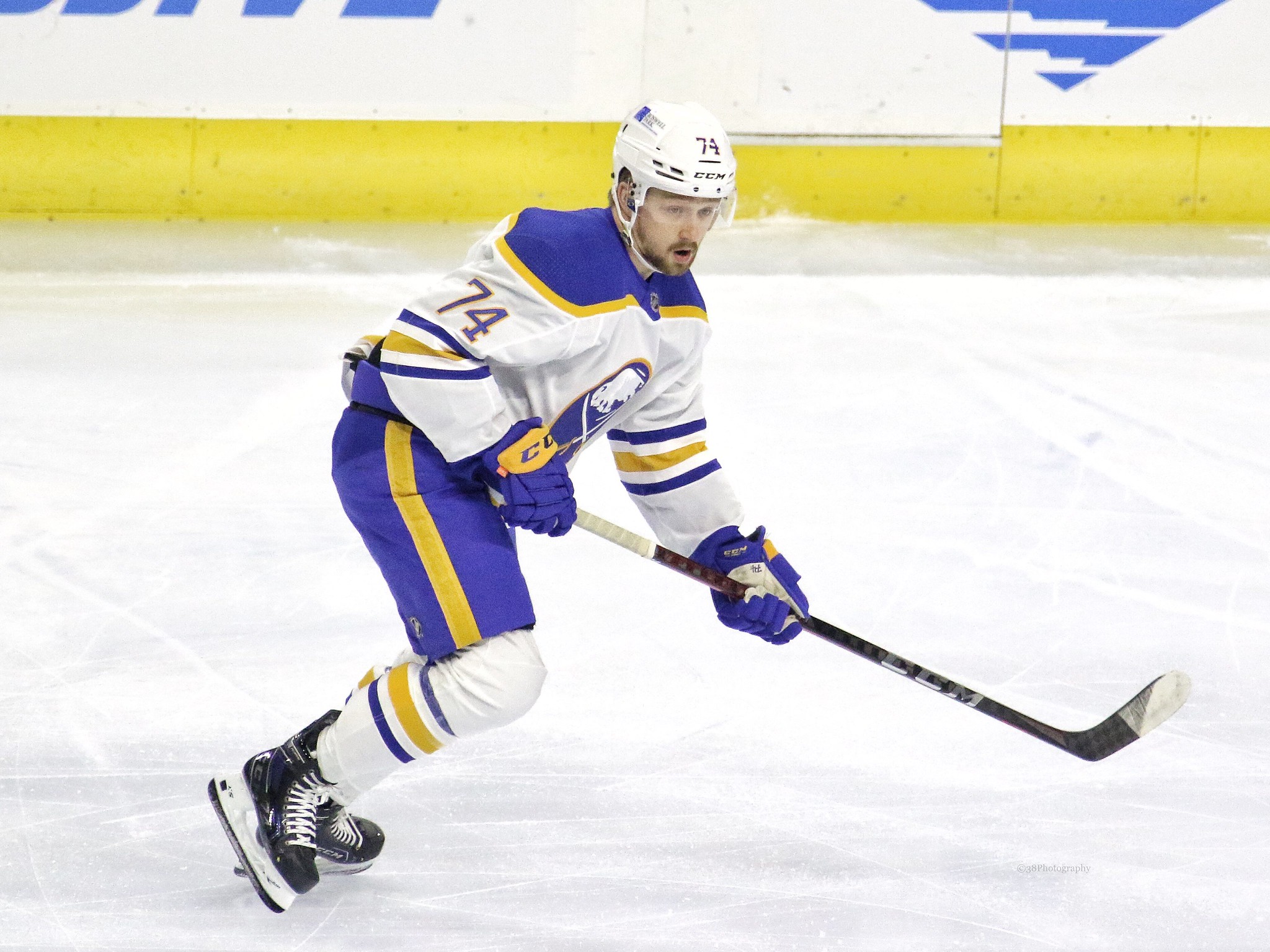Alex Nylander was not the only Swedish forward the Sabres drafted in the 2016 NHL Draft, as they also selected Rasmus Asplund in the second round. After playing a combined 57 games in 2019-2020 and 2020-2021, he more than doubled that total this season, to the tune of 80 games. He showed flashes of the player he can be in previous seasons, but this year he carved out a role for himself as a competent defensive forward who can chip in occasionally on offense.
Asplund Flew Under the Radar Before the Season
In the limited sample size prior to this season, Asplund showed signs he could be an effective player at the NHL level, and not only was he inconsistent, but he would also somewhat disappear for stretches of games. Towards the end of the 2020-2021 season, Asplund’s playing time increased under head coach Don Granato to the point where he was on the Sabres’ roster full-time from the middle of March on.

Those games provided a tryout of sorts for Asplund, and he took full advantage. He scored seven goal and added four assists for 11 points in 28 games. While 11 points is certainly not an eye-popping number, the impact Asplund brings to a team will never be reflected in his point totals. He also managed to have a positive plus/minus rating, finishing at plus-1. Plus/minus is definitely a controversial stat, but finishing positive on a horrendous team like last year’s Sabres should be considered somewhat of an accomplishment.
Related: Buffalo Sabres Player Season Report Card: Jeff Skinner
The runway Granato provided Asplund gave him an opportunity to display the role he can play in the NHL. Granato gave him some limited penalty kill minutes, and played him in the defensive zone in somewhat of a shutdown role. He showed he can be a solid middle-six option who can play with a variety of players, and he finished the 2020-2021 season showing promise heading into the offseason.
Asplund’s Impact for the Sabres Goes Beyond Points
The momentum Asplund created for himself earned him a full-time spot with the Sabres this season. He recorded eight goals and 19 assists for 27 points in 80 games. While he only eclipsed his previous season goal total by one, he was given more of an opportunity to contribute offensively this season in the form of increased offensive zone shifts and power-play time, where he scored two goals and two assists. He was a responsible defensive player when called upon, with some of his goals coming from great defensive plays which he then transitioned to offense. His shorthanded goal against the LA Kings in late October stands out as an example, as Asplund breaks up the Kings offensive pressure and then takes the puck down the ice to find the back of the net.
Some of Asplund’s best work this year also came on the forecheck. Granato’s system favors pressuring the opposition whenever they have the puck, and Asplund was able to take advantage of that to create opportunities for his line mates. He sees the ice well, and is good at finding open ice in the offensive zone. In their game against the New York Rangers in late March, Dahlin was able to find a wide open Asplund at the net for a tap-in goal. It was a great play by Dahlin, but the goal is never scored if Asplund doesn’t use his vision to find the open ice.
His goal scoring this season certainly wasn’t enough to wow you, but his passing, defensive work and ability to read the play to find open ice gave him the opportunities to excel with anyone he played with.
Future Role for Asplund and Final Grade
Asplund is under contract for two more seasons at $825,000, and the expectations for him moving forward are more of the same. He should slot into one of the Sabres’ middle-or-bottom-six forward lines, with dependable and trustworthy play in all three zones. He will still be 24 when next season commences, so there is still room for Asplund to grow his game, and his point production could certainly increase next season with a full year of experience under his belt.
As a whole, Asplund met the expectations that were placed on him heading into the year, but he definitely has room to improve. Considering his role, the increase in his points total from last season to this year, and the room for improvement going into next season, his overall grade is a B-.

Zach Rohde is a Buffalo Sabres Contributor for THW. Growing up in the Buffalo area during the late 2000s, the Sabres success fueled his passion for hockey. He has written about the Sabres for another site in Buffalo previously, and covered Buffalo Sports for a brief time as a freelance sports assistant for Spectrum News Buffalo before moving to a full time position in general news. Twitter: @ZachRohde